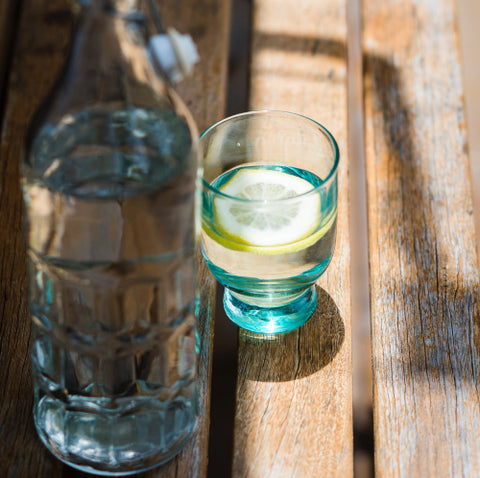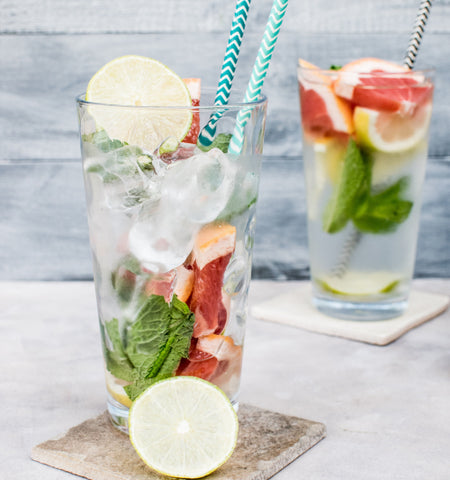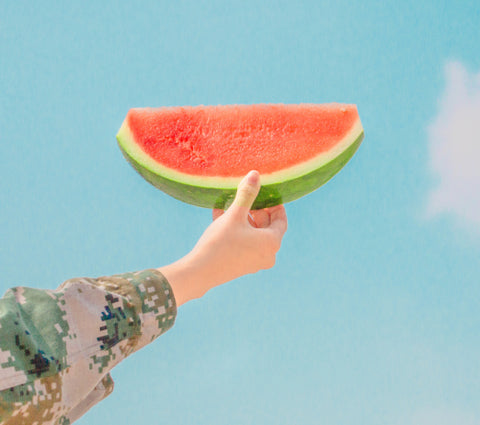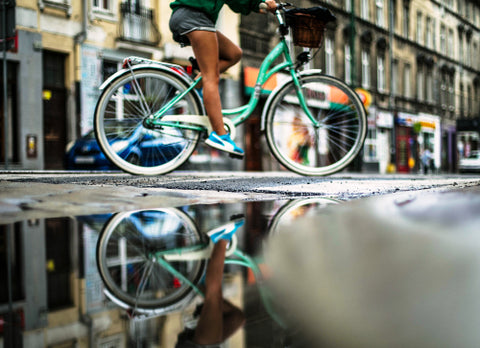
Stay Hydrated This Summer!
Las Vegas! You’re NOT Drinking Enough Water!
Outdoor activities, BBQs, festivals, family vacations, long days in the sun. Summer is here.
And one of the things people often forget about during summer is dehydration. You just don’t see it coming. Lack of water, electrolyte imbalances, and even heat stroke can be much more common and easy to experience than you might think.
Let’s dive right in.
Nowadays in the US, over 50% of all children and adolescents don’t get the hydration they need, stated research from the Harvard T.H. Chan School of Public Health. When you look at those involved in sports that number skyrockets. A study in the International Journal of Sports Nutrition and Exercise Metabolism showed that of the 11- to 16-year-old children playing in a summer soccer camp, nine out of 10 of them weren’t getting enough water. This puts them at risk for developing serious health issues.
Dehydration can be serious and lead to problems like swollen feet or a headache and life-threatening conditions like heat stroke.
To keep yourself and your family hydrated, try out some of the easy tricks!
Water is Best
Generally, water is the best thing to drink for hydration. Some fruits and vegetables that contain a high percentage of water can also provide hydration. And while sports drinks with electrolytes can be good for those involved in high-intensity activities in very hot weather, they tend to be high in added sugar and calories.

It’s a lot better to drink water while you’re exercising, and after you’re finished, eat a healthy snack like oranges, bananas, or a handful of unsalted nuts.
Fruit juices or sugary drinks, like soda, can be hard on your stomach when you need more water. Additionally, avoiding caffeinated drinks, which can be diuretics that cause you to lose more fluids, will also be important.
To top it off, drink plenty of water before you go out in the heat. Don’t start your experience in hot weather already dehydrated.
Not only will your stomach and overall wellbeing be thankful for it, but your heart will also appreciate it too since keeping the body hydrated helps the heart pump blood easier and get it to your muscles easier.
John Batson, M.D, a sports medicine physician with Lowcountry Spine & Sport in Hilton Head Island, S.C., and an American Heart Association volunteer, says, “If you’re well hydrated, your heart doesn’t have to work as hard.”
Hydration-Boosting Nutrients
Jennifer Williams, a research scientist with Abbott stated that to stay hydrated, you and your family often need more than water. You also need electrolytes and carbohydrates.
The nutrients help your body absorb fluids, and electrolytes – sodium, chloride, potassium, magnesium, and calcium – are critical to healthy nerve and muscle function. When we sweat heavily we lose a lot of electrolytes, so we need to replace these.
Luckily, electrolyte drinks like Pedialyte contain both electrolytes and carbohydrates, which are perfect when exercising for longer than 60 minutes or during any activity performed in extreme temperatures.
Hydrating Foods
Did you know that your food choices can account for roughly 20% of your daily fluid intake? It’s true! Foods are a significant part of you and your family’s overall hydration health. The good news? Many foods we love during summer – like watermelon, tomatoes, pineapple, and strawberries – are very rich in water, carbohydrates, and minerals, including electrolytes.
Pre- and post-workout snacks that are high in water are a wonderful idea. You might also want to try infusing your water with fresh fruit and veggies like cucumber. It’ll make drinking enough water much more fun and tasty!

In fact, make drinking your water feel special and even a bit extra by taking it with you to the pool and sipping while you enjoy the weather. There are some great options that are stylish and keep you out of the sun right here.
It can also be a great way to get your kids to drink enough water which is crucial because they are more susceptible to dehydration and heat stroke. In fact, studies from McMaster University show that when given beverages with flavor, carbs, and the electrolyte sodium chloride, young boys willingly drink up to 90% more fluid than otherwise.
Parenting Hack!
Observe Your Output
Williams also reminded that urine color can be an easy way to check your hydration status. Before, during, and after outdoor activities, take a quick look at your urine. If your urine is a light lemonade color, it’s likely that you are properly hydrated. Dark yellow urine, like darker than apple juice, usually means you’re dehydrated and your need to rehydrate immediately.
Watch Your Workout
Sweating is a major contributor to dehydration during summer sports. It quickly evaporates off your skin and in hot temperatures it does so even quicker. Williams suggests weighing yourself without clothes both prior to and following exercise to understand how much sweat you’ve lost and how much you’ll need to drink to recover.
For every pound lost between the beginning and end of your workout 16 oz. of water are gone.
Losing under 1% of your body weight during your workout is best according to Williams. Once you’re over the 1% mark, your performance can start to suffer and you’ll feel much more fatigued. For a ballpark number, if you weigh 180 lbs., you should be aiming for less than 1.8 pounds lost.
It’s also crucial that you begin your day and or workout hydrated- before you start losing water. Keep this up all day and be sure to replenish lost hydration as soon as you’re finished with your workout or activity.
What if you’re workout or activity is right away in the morning? You’ll need to make sure you’re plenty hydrated the night before. You aren’t drinking when you’re asleep, so it’s important to be good and hydrated before bedtime. To help with this, make sure you aren’t getting overly hot while you’re sleeping by turning the temp down. It’ll help you conserve water and sleep better.
Drink plenty of water a couple of hours before bed and when you get up.
Fly Better with Fluids
You might never have considered it but traveling at the airport and being on a plane can be very dehydrating. You’re on the go and distracted from drinking enough water. Plus, airplanes are known for low-humidity air.
To avoid pricey water at the airport, pack an empty bottle in your carry on and fill it up at a water fountain. Several airports are offering special fountains specifically for refilling water bottles. If the dehydration is especially bad, pack a Pedialyte pouch as well so that you can replace lost electrolytes.

Also, don’t go crazy at the vending machine. Soda and salty snacks can add to dehydration. During the flight, you can opt for sparkling water instead of soda and hydrating fruit instead of chips as well. Williams says, “Soft drinks do a [bad] job at rehydration [...] [T]he high sugar concentration can interfere with your body’s ability to absorb water.”
How Much Water Do You Need?
John Baston M.D. explains that the amount of water you need depends on climate conditions, what you’re wearing, and the length and intensity of your exercise.
Another thing to keep in mind is that if you sweat heavily, you’ll need to drink more water. Certain medical concerns, like diabetes or heart disease, can also require greater water consumption.
Some medications can also lead to dehydration. For these situations, it’s best to talk to your doctor or GP to see how much water you’ll need to drink.
Baston also stated that “If you get thirsty, you’re already dehydrated.” Many of us have heard that being thirsty means hydration is already an issue, and it turns out this healthcare myth is actually a healthcare fact.
Baston also recommends weighing yourself to see how much water you’ve lost and states that “For every pound of sweat you lose, that’s a pint of water you’ll need to replenish.” That means you’ll need to drink about 16 oz.
Also, keep in mind that if you’re not sweating during vigorous physical activity where you’d normally sweat a lot it can be a red flag that you’re dehydrated and might develop heat exhaustion.
Overall, try to be drinking the eight 8 oz. glasses of water just to be sure you’re hydrated but don’t feel the need to drink so much water that you’re peeing constantly and it’s clear. That’s too much.
Not Only When Exercising
Hydration isn’t only crucial when enjoying physical activity. Sitting in the sun on a hot or humid day can also cause dehydration. People with a heart condition, are over 50, or overweight may also require extra precautions.

Additionally, when you’re pregnant or breastfeeding, are suffering from stomach upsets, or live in a very dry climate, like Las Vegas, you’ll need more water. When I was as big as a house thanks to my little girl, I was drinking a gallon of water a day!
Don’t risk your health. Stay Hydrated. Stay Happy.

